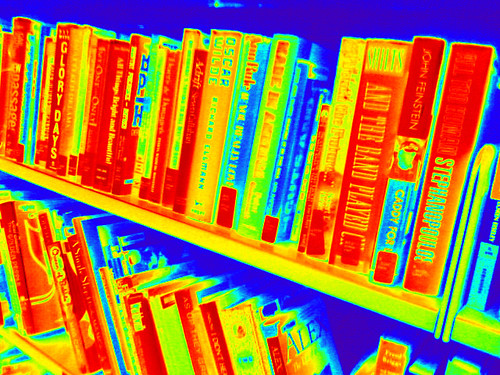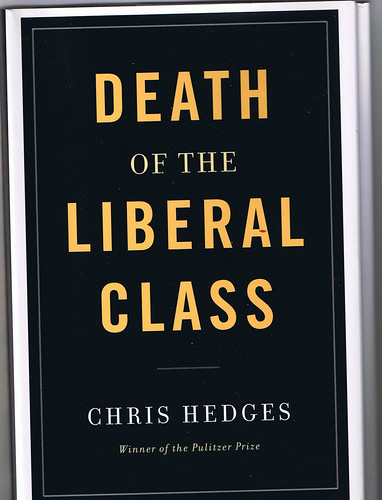
Each week, we get closer to winding down our series on the ten most important books of the last ten year (2001 through 2011). And more and more e-mails stream in asking us not to forget this book and that book. The ten are pretty much picked and, after this week's pick, there are only two more choices.
To clarify, there were things we wanted to include and debated before deciding no. "You Have The Right To Remain Silent," for example, is one of the most important publications of the last ten years, no question. Put out by the National Lawyers Guild, the document is one everyone should have a copy of, in our opinions. But this feature was about getting you to use your local libraries which are facing huge budget cuts and need support from their communities. The NLG publication is available online. We were looking for things that would have you visiting your library for.
But don't many people use the library computers to surf the web? Ty raised that issue but it was quickly pointed out that many libraries limit users to 15 to 20 minutes of online time due to the large number of patrons wanting to use their computers.
So we went with books that were published and that should be easily available through ILL if they were not physically at your local library.
Our eighth pick is an obvious one for readers of this site,

Chris Hedges' Death of the Liberal Class. The book came out at the end of 2010 and is powerful and haunting. As Betty noted last week, "When I read his book, Death of the Liberal Class, I thought he made an interesting argument and that a great many of his calls were probably true. I did not, however, feel that it truly was the end. Now I really do. It's as if all the false-fronts have gone transparent." It's a book that, reader Woody noted in an e-mail to this site, Elaine can't stop noting at her own site. He e-mailed with a list of Elaine's posts where she's brought up the book. Hearing the list today, Elaine was surprised that she had noted it that often but states, "It goes to the fact that it's one of the books -- one of the few books -- that truly end up mattering. It was important when it was published, it's only grown more important since."
The country needs radicals on the left. They need someone who takes a hard left position and does so in an uncompromising manner. Otherwise, the country veers to the right. Next week the "SuperCongress" presents a plan (or is supposed to) for cuts, cuts that could very well gut the safety net. How did we arrive at this point?
It's all there in Chris Hedges' book. People rushed to be respectable. People rushed to serve the powers that be. People rushed to distance themselves from the controversial. People rushed to enrich themselves by turning on others. Most of all they rushed to whore for the Democratic Party.
And Hedges does this with not only his own observations but by mining earlier critiques when sell-outs were actually taking place. Such as when he drops back to the seventies to note:
Once intellectuals transfer their allegiance to the practical aims of power and material advantage, they emasculate themselves as intellectuals. They disregard unpleasant truths and morality to influence or incorporate themselves into systems of power. Stanley Hoffman denounced the liberal class for the bond between the scholarly world and the world of power in his 1977 essay "An American Social Science: International Relations" in Daedalus magazine. Academics and researchers, he notes, were "not merely in the corridors but also the kitchens of power." What had once been an intellectual exchange had become a professional one. Liberal foundations, Hoffman writes, had became "a golden halfway house between Washington and academia." Scholars saw themselves as efficient Machiavellians who were there to advise "the Prince on how best to manage his power and on how best to promote the national interest." Scholarship became directed toward the tiny elite in the hope of shaping policy. And the closer scholars came to the centers of power, the greater the temptation was to "slight the research and to slant the advocacy for reasons either of personal career or of political or bureaucratic opportunity." This meant that the scholar "may still be highly useful as an intelligent and skilled decision-maker -- but not as a scholar." Hoffman argued that "the greatest hope for the science world would lie in blowing up the bridge that leads across the moat into the citadel of power."
The liberal class today is called out as well. At this site, we identify the liberal class as whores who will not tell the truth about Barack Obama. They've whored ever since 2008. They will explode at the Tea Party, they will try to tell you how outrageous the (out of power) Republican Party is. But they will look the other way on a war mongerer like Barack Obama. To try to prove they have "balls" (the term they most equate with power -- not our term for it), they will go to town on Hillary Clinton as if that proves they're brave and independent, as if their sexist attacks on the Secretary of State excuse their silence on the sins of the President of the United States. Chris Hedges notes the corruption in today's liberal class throughout the book.
Our destitute working class now understands that the cloying feel-your-pain language of the liberal class is a lie. The liberal class is not attempting to prevent wages from sinking, unemployment from mounting, foreclosures from ripping apart communities, or jobs from being exported. The gap between a stark reality and the happy illusions peddled by smarmy television news personalities, fatuous academic and financial experts, oily bureaucrats and politicians, is becoming too wide to ignore. Those cast aside are often willing to listen to anyone, no matter how buffoonish or ignorant, who promises that the parasites and courtiers who serve the corporate state will disappear. Right-wing rage is becoming synomous with right-wing populism. Obama, seduced by power and prestige, is more interested in courting the corporate rich than in saving the disenfranchised. Asked to name a business executive he admires, the president cited Frederick Smith of FedEx, although Smith is a union-busting Republican. Smith, who was a member of Yale's secret Skull and Bones Society along with George W. Bush and John Kerry, served as Senator John McCain's finance chair during McCain's failed run for the presidency. Smith founded FedEx in 1971, and the company had more than $35 billion in revenue in the fiscal year that ended in May 2009. Smith is rich and powerful, but there is no ethical system, religious or secular, that would hold him up as a man worthy of emulation.
For more on Death of the Liberal Class, you can also refer to our "Chris Hedges' Death of the Liberal Class" from January of this year.
In this series of ten important books of the last ten years, we've also selected "Shirley MacLaine's I'm Over All That," "CCR's Articles of Impeachment Against Bush," "Manal M. Omar's Barefoot in Baghdad," "Susan Faludi's The Terror Dream," "Joyce Murdoch and Deb Price's Courting Justice," "Anthony Arnove's Iraq: The Logic Of Withdrawal" and "Tori's Piece by Piece." Due to the Great Recession, your local libraries are both overtaxed (seeing more patrons than ever before) and underfunded. Make a point to check out your local library or local branch of your library and consider letting your local representatives know that you support increasing the budget for the library.
